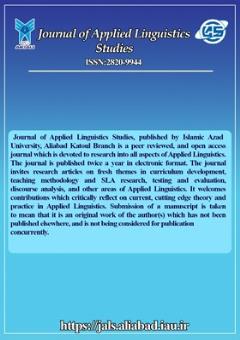Unveiling Educational Insights: Exploring Students' Perceptions of the Hidden Curriculum in TEFL at the Undergraduate Level in Iran
Subject Areas : Journal of Applied Linguistics Studies
Bahman Kazemi
1
,
Hamid Ashraf
2
*
![]() ,
Khalil Motallebzadeh
3
,
Mitra zeraatpishe
4
,
Khalil Motallebzadeh
3
,
Mitra zeraatpishe
4
1 - Department of English, Torbat Heydarieh Branch, Islamic Azad University, Torbat Heydarieh, Iran
2 - Department of English, Torbat Heydarieh Branch, Islamic Azad University, Torbat Heydarieh, Iran
3 - Department of English, Torbat Heydarieh Branch, Islamic Azad University, Torbat Heydarieh, Iran
4 - Department of English, Mashhad Branch, Islamic Azad University, Mashhad, Iran
Keywords: Hidden curriculum, TEFL, learners' perspectives, the BA level, curriculum development.,
Abstract :
This study aimed to scrutinize the dimensions of the hidden curriculum in Teaching English as a Foreign Language (TEFL) at the undergraduate level in the Iranian context, with a specific focus on the perspectives of university learners. Employing a mixed-methods approach, the research encompasses an extensive review of pertinent literature. A randomly selected cohort of 327 English as a Foreign Language (EFL) learners pursuing undergraduate studies in teaching English across various colleges and universities in Iran constituted the study participants. The investigative tools utilized in this study comprised a 33-item questionnaire designed to explore diverse facets of the hidden curriculum at the undergraduate level for the quantitative phase. Additionally, for the qualitative component, an open-ended question and a semi-structured interview format were employed. The quantitative findings unveiled that the organizational ambiance of the university, the social milieu within the educational institution, the dynamics of student-teacher relationships in classes, and the non-academic dimensions of university courses exert a discernible impact on students' cognitions, emotions, and behaviors within the academic environment. Consequently, these aspects are identified as integral components of the hidden curriculum within the TEFL undergraduate program in Iran. The qualitative results of the study are also presented, contributing to a nuanced understanding of the non-academic factors that wield substantial influence on academic outcomes within university settings.

